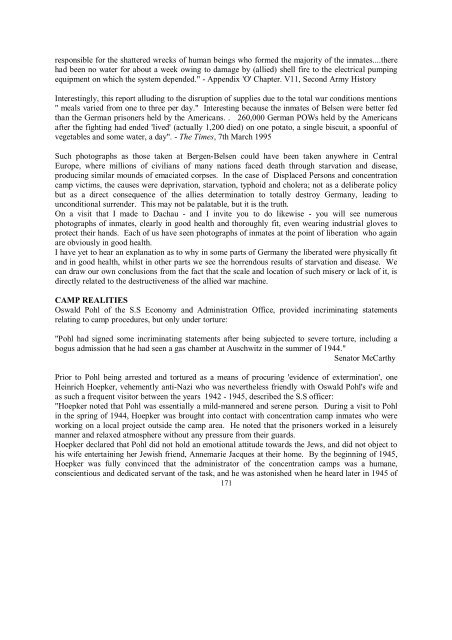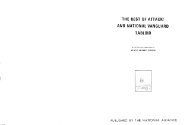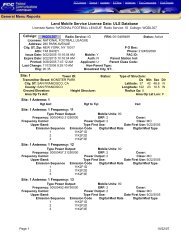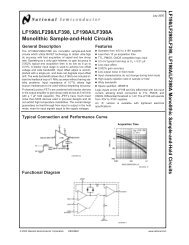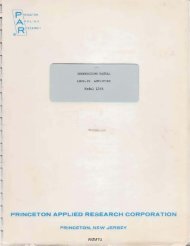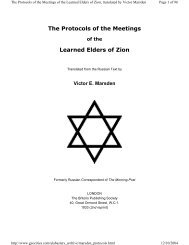Stands Among The World's Most Stands Among The ... - Index of
Stands Among The World's Most Stands Among The ... - Index of
Stands Among The World's Most Stands Among The ... - Index of
You also want an ePaper? Increase the reach of your titles
YUMPU automatically turns print PDFs into web optimized ePapers that Google loves.
esponsible for the shattered wrecks <strong>of</strong> human beings who formed the majority <strong>of</strong> the inmates....there<br />
had been no water for about a week owing to damage by (allied) shell fire to the electrical pumping<br />
equipment on which the system depended." - Appendix 'O' Chapter. V11, Second Army History<br />
Interestingly, this report alluding to the disruption <strong>of</strong> supplies due to the total war conditions mentions<br />
" meals varied from one to three per day." Interesting because the inmates <strong>of</strong> Belsen were better fed<br />
than the German prisoners held by the Americans. . 260,000 German POWs held by the Americans<br />
after the fighting had ended 'lived' (actually 1,200 died) on one potato, a single biscuit, a spoonful <strong>of</strong><br />
vegetables and some water, a day". - <strong>The</strong> Times, 7th March 1995<br />
Such photographs as those taken at Bergen-Belsen could have been taken anywhere in Central<br />
Europe, where millions <strong>of</strong> civilians <strong>of</strong> many nations faced death through starvation and disease,<br />
producing similar mounds <strong>of</strong> emaciated corpses. In the case <strong>of</strong> Displaced Persons and concentration<br />
camp victims, the causes were deprivation, starvation, typhoid and cholera; not as a deliberate policy<br />
but as a direct consequence <strong>of</strong> the allies determination to totally destroy Germany, leading to<br />
unconditional surrender. This may not be palatable, but it is the truth.<br />
On a visit that I made to Dachau - and I invite you to do likewise - you will see numerous<br />
photographs <strong>of</strong> inmates, clearly in good health and thoroughly fit, even wearing industrial gloves to<br />
protect their hands. Each <strong>of</strong> us have seen photographs <strong>of</strong> inmates at the point <strong>of</strong> liberation who again<br />
are obviously in good health.<br />
I have yet to hear an explanation as to why in some parts <strong>of</strong> Germany the liberated were physically fit<br />
and in good health, whilst in other parts we see the horrendous results <strong>of</strong> starvation and disease. We<br />
can draw our own conclusions from the fact that the scale and location <strong>of</strong> such misery or lack <strong>of</strong> it, is<br />
directly related to the destructiveness <strong>of</strong> the allied war machine.<br />
CAMP REALITIES<br />
Oswald Pohl <strong>of</strong> the S.S Economy and Administration Office, provided incriminating statements<br />
relating to camp procedures, but only under torture:<br />
"Pohl had signed some incriminating statements after being subjected to severe torture, including a<br />
bogus admission that he had seen a gas chamber at Auschwitz in the summer <strong>of</strong> 1944."<br />
Senator McCarthy<br />
Prior to Pohl being arrested and tortured as a means <strong>of</strong> procuring 'evidence <strong>of</strong> extermination', one<br />
Heinrich Hoepker, vehemently anti-Nazi who was nevertheless friendly with Oswald Pohl's wife and<br />
as such a frequent visitor between the years 1942 - 1945, described the S.S <strong>of</strong>ficer:<br />
"Hoepker noted that Pohl was essentially a mild-mannered and serene person. During a visit to Pohl<br />
in the spring <strong>of</strong> 1944, Hoepker was brought into contact with concentration camp inmates who were<br />
working on a local project outside the camp area. He noted that the prisoners worked in a leisurely<br />
manner and relaxed atmosphere without any pressure from their guards.<br />
Hoepker declared that Pohl did not hold an emotional attitude towards the Jews, and did not object to<br />
his wife entertaining her Jewish friend, Annemarie Jacques at their home. By the beginning <strong>of</strong> 1945,<br />
Hoepker was fully convinced that the administrator <strong>of</strong> the concentration camps was a humane,<br />
conscientious and dedicated servant <strong>of</strong> the task, and he was astonished when he heard later in 1945 <strong>of</strong><br />
171


